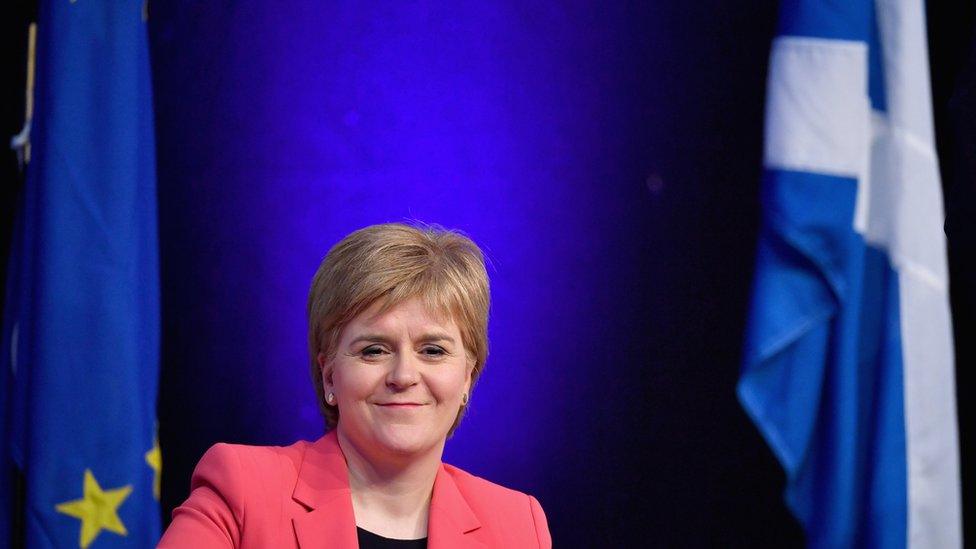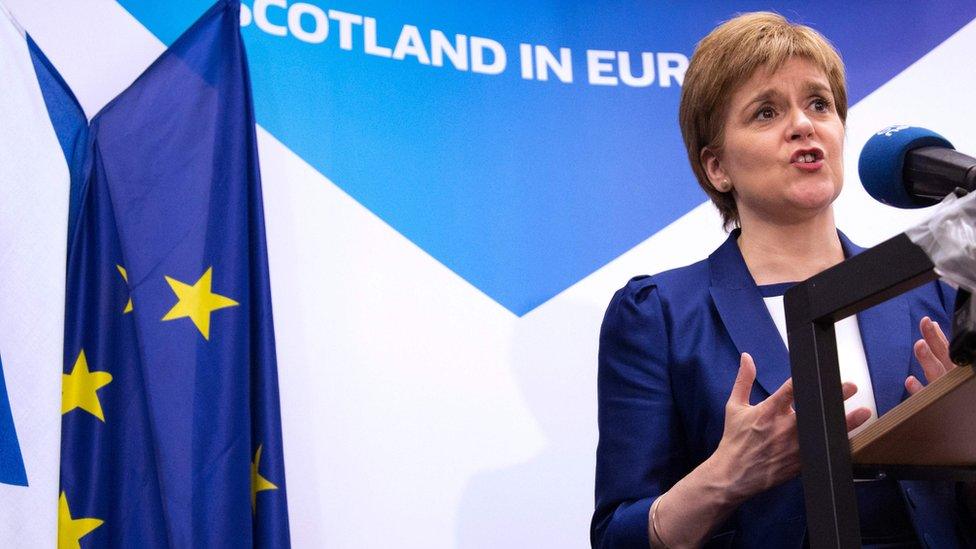Politics... or arithmetic?
- Published

Curious and intriguing, the memories which float to the surface at odd moments. Let me share with you today a conversation from a wee while back with a potential council candidate.
He was trying to explain the complexities of the Single Transferable Vote to older colleagues who had become accustomed to their party gathering seats by the bucket-load under the previous system.
(Guess which party? Yep, that's right.)
Anyway, he was finding it difficult to convince his chums that they might need to target the number of candidates in order to maximise their realistic return.
"We've aye stood in every ward," just about summed up the response.
"Look," he finally declared in exasperation, "this isnae politics, this is ….ing arithmetic!"
Well, there is a fair dose of arithmetic on display in today's pronouncements by the first minister on the putative cost of Brexit to Scotland.
But there is more of a touch of politics too. Much more.
You will have encountered the details elsewhere, no doubt. But in brief.
The Scottish government has pulled together figures which suggest that the economic downside of Brexit to Scotland could range from £3.7bn to £11.2bn per annum by 2030, including a hit of between £1.7bn and £3.7bn on tax revenue.

"Pulled together?" These figures are not new, distinct research by the government.
They are a composite based upon data already published by established economists and forecasters. Whose views are generally respected - except during the EU referendum when they were roundly dissed by the Leave side which managed to turn expertise into a badge of shame.
Huge caveats, of course. We are talking about 2030, many years hence. By then, Dundee United will have returned to their rightful place at the summit of Scottish football and will, indeed, have won the European Champions League. (I promise to tweet on that glorious day.)
By then, many other factors will have come into play, including varying global trade and Britain's/Scotland's place therein. By then, the Scottish economy will have thrived/tanked/coasted, with a concomitant impact on GDP and revenues.
So these figures are an arithmetical forecast, with caveats. They will be contested by those who argue that the UK/Scotland can thrive outside the EU. But they are also - indeed, primarily - a political tool.
Practical implications
Firstly, and most immediately, Nicola Sturgeon is seeking to some extent to pre-empt the publication on Wednesday of Government Expenditure and Revenue Scotland (GERS) figures. Given that oil has continued to decline and that the economy generally is less than buoyant, the latest GERS verdict is unlikely to be rosy.
Secondly, and much more saliently, Ms Sturgeon is aiming an attack at the UK government and those who are currently pondering the practical implications of the Brexit vote.
She is saying that unless Brexit is accompanied by a soft landing, unless there is substantial mitigation, unless the terms can be made relatively favourable, the potential cost is huge. So today's paper is designed to contribute, sharply, to the Brexit preparation process.
However, there is a wider point. It is "simply unacceptable", Ms Sturgeon says, that "Scotland faces the prospect of being dragged out of the EU against its will".
Here we have indyref2 in incubation. Albeit at a very, very early stage. Albeit that it is by no means certain, that it may not happen in the short to medium term.
Press buttons
Scottish Secretary David Mundell has made considerable play of arguing that Brexit has created uncertainty and disquiet. That it would, consequently, be wrong to add to such anxiety by holding a further referendum on independence.
Ms Sturgeon can essay the retort acid: she can say that it was the Tories who generated the guddle in the first place. But she also knows that Mr Mundell's point, unless contested, may weigh with worried voters, if repeated constantly.
And constant it will be. Only today, the Scottish Conservative leader Ruth Davidson is arguing that Ms Sturgeon should stick "one hundred per cent" to the day job of growing Scotland's economy with existing powers.
The first minister will reply that her team are pulling every lever and pressing every button in order to achieve such an outcome - but that they also have room for contemplating Scotland's wider economic and constitutional condition.
Hence today's paper - which has a single transferable purpose, working at disparate levels. In essence, it is arguing that the UK government pursuit of Brexit, unless modified, will damage Scotland substantially. And implying that an alternative may have to be considered. To stress, may.
- Published23 August 2016
